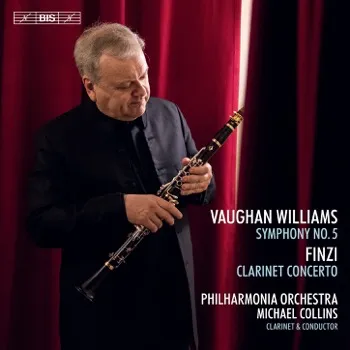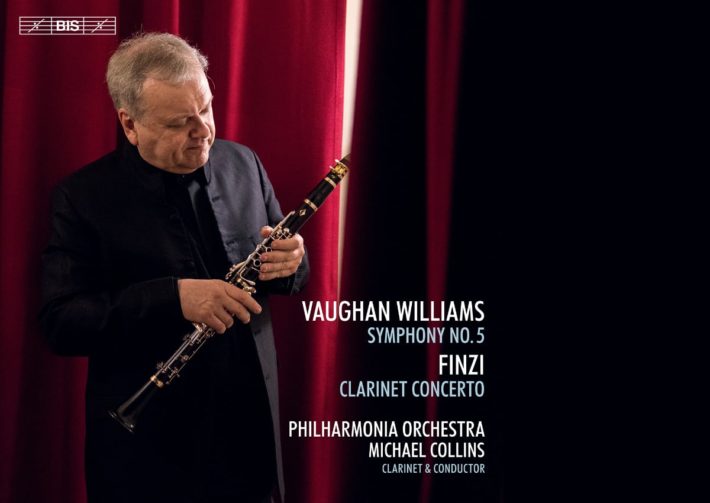Clarinetist Michael Collins ranks amongst the greatest champions of twentieth-century British music, along with the likes of Tasmin Little and Sir Andrew Davis. With several acclaimed albums dedicated to British clarinet music, Collins turns his attention for the third time to the unappreciated Finzi clarinet concerto. Replacing clarinet for a baton, Collins concludes the album with an insightful reading of Ralph Vaughan Williams’ 1943 wartime Fifth Symphony, with the Philharmonia Orchestra.

Collins creates a pensive air in the first movement of the symphony. The string tone is lean and monochromatic, which creates an ethereal, mystical and uncertain air. The horn motif, echoed by the woodwind, lilts swayingly on each return while carefully considered phrasing allows the music to breathe. The direction is clear, Collins seeks out the unknown; modulations are handled sensitively but he is not unafraid to delve into the darker corners as the music explores an array of emotions. At times the tempo marches on ever so briskly, skirting around and avoiding the occasional bleakness.
The scherzo, more akin to folk-music, has a curious balance. The woodwinds are less prominent, the strings are slightly more forward which emphasizes the textures in a different way, creating a more unsettling, restless and yearning ambiance, while the brass play authoritatively and nobly. Collins allows moments of dissonance to be refreshingly brutal and contrasting.
The string textures of the third movement’s Romanza hark back to the Tallis Fantasia, the dedicatee of the symphony. The cor anglais’ melody — plaintiff and solemn, appears through the mist like a homage to Sibelius’ The Swan of Tuonela. Collins relishes the melancholy, sweepingly navigating the swells of emotion, keeping restraint and avoiding over-sentimentality.
The passacaglia which forms the final movement becomes looser, meandering like the river Wye, eventually flowing out to sea. Collins finds the natural direction through the course of the movement, seeking out the happier and more restful nature of the music, finding a transcendence, almost spiritually, but certainly uplifting, in this most fervently self-proclaimed agnostic composer.
Throughout the symphony, Collins’ understanding of woodwind and their role in this work bring something distinctive and persuasive. Somm’s 2007 release of a live performance from the BBC Proms in 1952 with the composer conducting has parallels to the overall approach from Collins. He doesn’t imitate, but finds something deeply personal, making a worthy statement in a distinctive reading, which emphasizes some unusual features. Any listener familiar with the symphony will listen to this afresh.
This is the third time Collins has recorded the Finzi Clarinet Concerto. His first (currently unavailable) with Hickox, the second for Chandos with himself directing the BBC Symphony Orchestra, and this more focused, direct, and authoritative performance, which overshadows his previous acclaimed recordings. The austere beginning is emphasized by the strings tone of the Philharmonia Orchestra, altogether a different experience and more urgent than his Chandos recording.
The desolation of the second movement’s opening is intensely emotional, giving way to something warmer, more melodic, Collins creating a moment to ponder. The final movement is delicately balanced where genuine rapport and trust between Collins and the orchestra is at its strongest. Collins’ sound is everything one could expect, but with an increased mellowness, which intensifies the richness of the piece.
The playing from the Philharmonia Orchestra is superb, giving Collins everything he desires to create a polished performance with emotional clarity. The purity of tone from the strings is beautiful and pristine, while woodwind and brass are highly commendable in the execution of the Vaughan Williams. There is a close, natural balance to the sound throughout, but in the Finzi a gentle and enhancing ambiance is more noticeable, especially on the SACD version. The prominence of Collins’ woodwind and sensitivity of the strings make this a serious contender for the definitive recording of the symphony. With the increased vision in the Finzi, this is a formidable and worthy release of twentieth-century British music.
Finzi – Clarinet Concerto
Vaughan Williams – Symphony No. 5
Philharmonia Orchestra
Michal Collins – Clarinet and Conductor
BIS Records, Hybrid SACD 2367




















